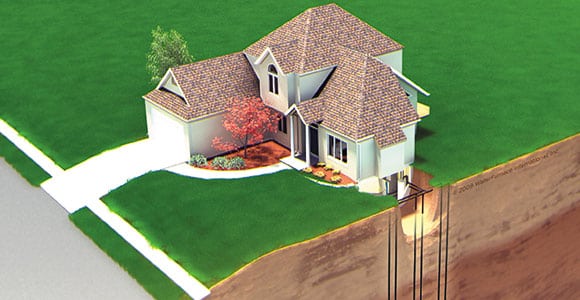Dear Jim: I have an old, inefficient propane furnace and central air conditioner. I was thinking about replacing them with a geothermal heat pump. Does this sound like a good idea, and what types are best? — Steve H.
Dear Steve: With all the problems last winter with propane shortages and the price uncertainty of natural gas, many people are considering geothermal heat pumps. In fact, I just installed a variable-speed WaterFurnace 7-Series geothermal heat pump in my own home.
In addition to extremely efficient and comfortable heating, a geothermal heat pump also is the most efficient central air-conditioning system available. During summer, when in the cooling mode, it provides free water-heating for additional savings.
Even though the overall geothermal heat pump cost is higher than other heat pump systems because of the ground loop, it will pay back its higher cost in savings. Also, if one is installed by 2016, there is a 30-percent federal tax credit on the total cost.
The difference between a standard and a geothermal heat pump is the geothermal unit uses liquid-filled (water/antifreeze mix) piping in the ground instead of the outdoor condenser unit. Since the ground stays at a fairly constant temperature, a geothermal unit is extremely efficient year-round. Most people install deep vertical loops, but I have a large backyard, so I installed a horizontal loop 5 feet deep.
The big advantage during winter is that the heating output of a geothermal system does not drop as it gets colder outdoors. This is when your house also needs the most heat. For this reason, the expensive backup electric resistance heating very seldom comes on with a geothermal heat pump.
I chose this WaterFurnace model because, with its variable-speed compressor, it has the highest heating and cooling efficiencies. The heating COP (coefficient of performance) is 5.3. Using the free heat from underground, it produces more than $5 worth of heat for each $1 on my utility bill.
When cooling during the summer, the EER (energy-efficiency ratio) is as high as 41. This is more than twice as efficient as the best new standard heat pumps and central air conditioners. Instead of the heat from the house being exhausted outdoors and wasted, it goes into the water heater for free heat.
For extra savings, I also installed an optional hot water assist unit. During winter, excess heat being produced by the geothermal heat pump goes into the standard electric water heater. This heats the water using just one-fifth as much electricity as the water heater elements.
The variable-speed compressor in my 7-Series model is connected to its matching thermostat to fine-tune its heating and cooling output to the instantaneous needs of my house. This provides excellent comfort and maintains even room temperatures and lower noise levels.
By constantly varying the output, it runs in more efficient, slower, quieter and longer cycles. This is coupled with a variable-speed blower that matches the airflow from the registers to the compressor output. This is why the comfort is so good.
Humidity control during summer is another significant advantage of the variable-speed compressor. Set the desired humidity on the thermostat. When it is humid but not very hot outdoors, the blower slows down and the compressor runs fast to provide more dehumidification with less cooling. This type of compressor also provides a 120-percent instant supercool mode.
The next step down in comfort and efficiency is a model with a two-stage compressor. Most of the time, it runs at the lower-output speed. When it cannot heat or cool your house to the thermostat setting, it automatically switches to the higher speed for more output. Its EER is as high as 30.
The simplest design is a single-stage compressor that is either on or off. This still provides much better comfort and savings over a standard heat pump.



